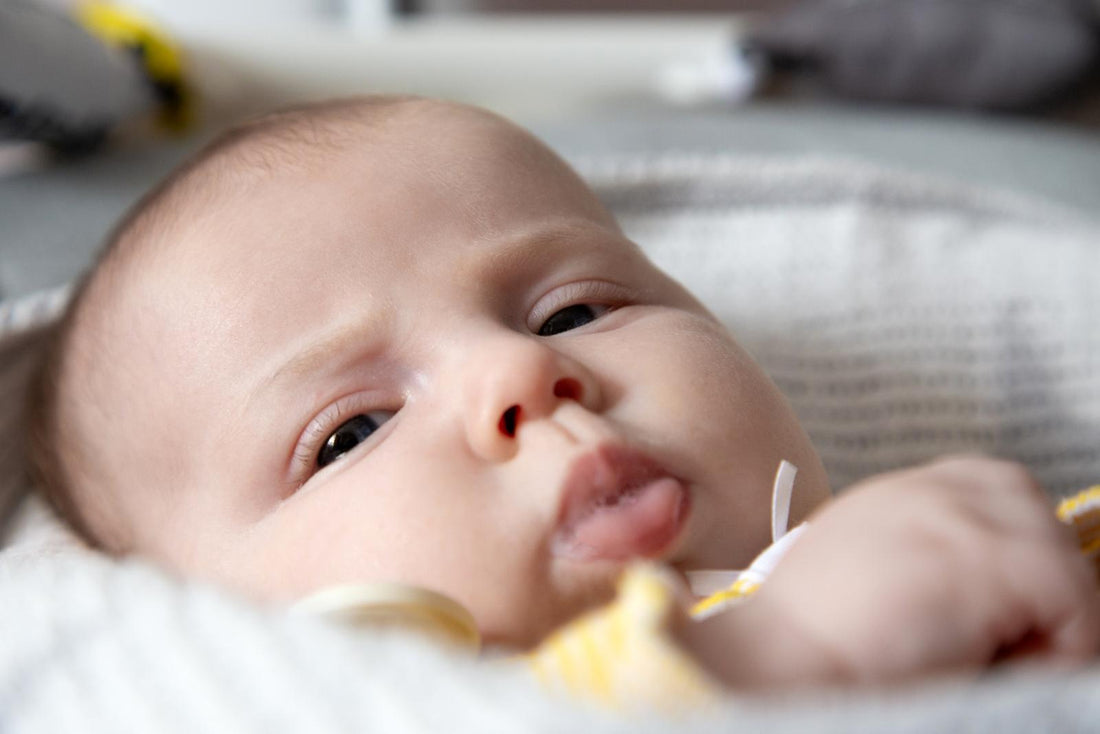Babies produce a lot of drool. It is one of the cutest things about them, and it can also be quite annoying when your baby has a habit of constantly drooling all over their clothes. But when will this drooling stop? Is there an age you should expect your baby to no longer be a drooler? Let’s take a look at when do babies stop drooling as well as some tips for managing the mess.
Why Babies Drool
Babies have salivary glands that produce saliva more frequently than adults, which is why baby drooling is so common. As drooling starts in the infant stage, baby saliva production continues to develop during the toddler years and saliva production significantly increases as baby teeth come in.
Because baby saliva glands are still forming, they're naturally less efficient, which can lead to excessive baby drooling. However, baby drooling assists with cleaning the baby's gums and protects them from any germs that could enter the breeding ground of the baby's new teeth.
To keep the baby's skin hydrated and healthy due to all the drooling, it is important for parents to gently wipe the baby's face often with a soft cloth or burp cloth.
Read More: Can Teething Cause Congestion?

When Do Babies Start Drooling?
As babies grow and develop, excessive drooling is a relatively common occurrence. It can start in the first three months and range in frequency and amount of saliva released, depending on the baby's development. This excessive saliva is beneficial to the baby; saliva bathes the oral cavity, clearing it of bacteria and debris that could otherwise cause infection.
The saliva also helps to buffer stomach acid after eating, since babies don't yet possess enough hormones which help to regulate stomach acid levels. Drooling usually stops when a child ages two or three years old; however, excessive drooling beyond this age may be symptomatic of other medical issues.
Of course, there are children who still drool past toddlerhood; if your child is still having difficulty managing their excess saliva after two years of age, it's advised to speak with a pediatrician or specialist about other possible options to address the issue.
How To Manage Baby’s Drool
There are ways to help manage baby’s drool, and we can show you how.
Patience Is Key
The first thing to remember when dealing with baby drool is to stay patient. It will take time before your little one learns how to swallow saliva or move it around in their mouth without it spilling out. During this time, you might see more drooling than usual—just keep reminding yourself that it’s all part of the process.
Stay Dry
When your baby is teething, they will produce even more saliva than usual which can make it hard to keep up with the drooling. The best way to manage this is by keeping towels and burp cloths handy at all times.
This will ensure your baby stays dry and protect their clothes from getting too wet or stained from saliva. Additionally, if you want an easier cleanup, use paper towels instead of cloth ones as they are disposable.
Read More: How Many Baby Bottles Do I Need?
Check for Allergies
If your baby is producing an unusually large amount of saliva, it could be because they are experiencing allergies. Allergens like pollen or dust can irritate the skin around their mouth, leading to excess saliva production as a response.
To check if allergens are causing your baby’s discomfort, try wiping down any exposed surfaces in the home such as furniture or toys, and see if this helps reduce drooling.

Natural Remedies To Curb Baby Drool
Nothing is more frustrating than constantly wiping baby drool off your little one’s chin. But before you reach for the nearest box of wipes, consider trying some natural remedies to help curb excessive drooling. Here are a few things to try that may help your baby keep drool at bay.
Increase Saliva Production
The best way to reduce excess saliva is to increase production. To do this, make sure your baby is drinking plenty of fluids throughout the day and give them plenty of opportunities to practice sucking and swallowing skills. You can offer bottles, and sippy cups, or even let them suck on a clean washcloth for practice.
Hydrate Skin
Extra saliva can cause skin irritation and chap so it’s important to keep your baby’s skin hydrated and moisturized. Look for gentle lotions that don’t contain too many fragrances or additives, as these can further irritate already-sensitive skin. Apply after each bath or as needed throughout the day and focus especially on areas prone to excess saliva such as the face, neck, chest, hands, and feet.
Use Humidifier
Create a wholesome environment for your baby with the help of a humidifier! Excess saliva production can be minimized by providing additional moisture, and dry skin issues may even disappear. Furthermore, it will soothe their throat and respiratory system during nighttime when drooling is more common to happen.
Read More: Can Babies Drink Cold Formula?
Conclusion
It’s normal for babies to drool, but it can be difficult to manage. Knowing when babies start and stop drooling as well as how to manage the mess is essential for any parent. Usually, excessive baby drooling subsides between 2 -3 years of age, but this may vary depending on your child's development.

